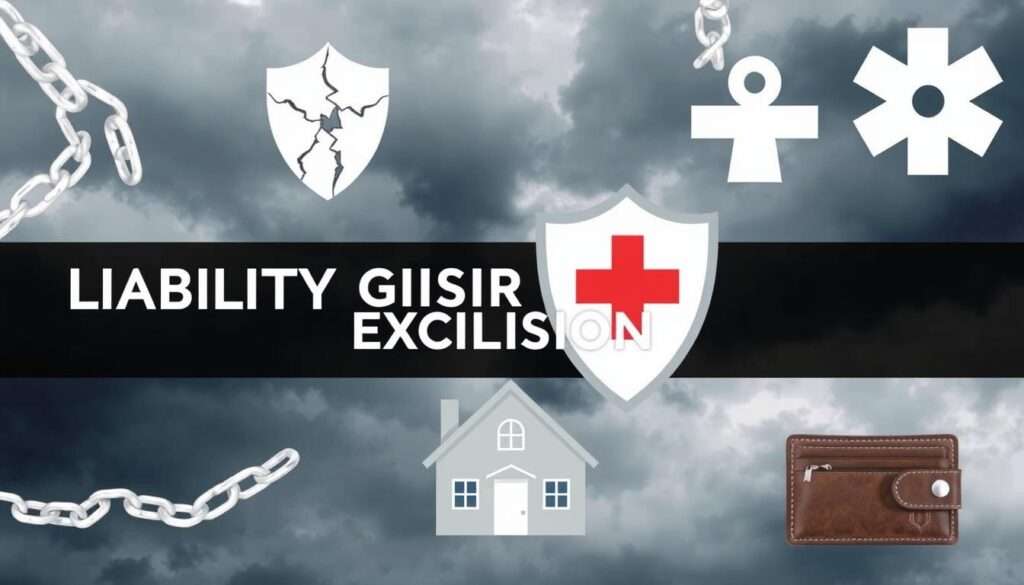Liability insurance is key to protecting your assets and keeping your finances safe. This guide covers the basics of liability coverage. It talks about its benefits, who needs it, and how it helps against legal issues. Whether you’re an individual or a business owner, this article will help you understand liability insurance. It shows how it keeps your financial security intact.
Key Takeaways
- Liability insurance gives you financial protection against legal claims and lawsuits. This includes accidents, injuries, or damages caused by you.
- It covers legal defense costs and any settlements or judgments. This keeps your assets and finances safe.
- Liability coverage is vital for individuals, homeowners, renters, business owners, and professionals. It helps manage the risks they face.
- Knowing the different types of liability insurance is important. This includes general, professional, and auto liability. It helps you choose the right coverage for your needs.
- Choosing the right liability limits and understanding policy exclusions is crucial. It ensures you have enough protection.
Understanding the Basics of Liability Insurance Protection
Liability coverage is key to avoiding financial risks. It’s vital for both business owners and individuals. Let’s explore the types of liability coverage, who needs it, and important terms.
Types of Liability Coverage Available
Liability insurance has many forms, each for different needs. General liability protects against injuries, property damage, and personal/advertising issues. Professional liability (or errors and omissions insurance) helps professionals against negligence claims. Product liability covers manufacturers and sellers against claims about defective or dangerous products. An umbrella liability policy adds extra protection beyond other policies’ limits.
Who Needs Liability Insurance
- Business owners, to protect their operations from lawsuits and claims
- Professionals, such as doctors, lawyers, and consultants, to safeguard their work and reputation
- Homeowners and renters, to cover personal liability for injuries or property damage on their property
- Vehicle owners, to meet state-mandated auto liability insurance requirements
Key Terms and Definitions
Knowing liability insurance terms is essential. Some important terms include:
- Limits of liability: The maximum an insurer will pay for a covered claim
- Deductible: The amount you must pay before insurance coverage starts
- Exclusions: Specific situations or events not covered by the policy
- Occurrence-based coverage: Protects against claims from incidents during the policy period, even if reported later
- Claims-made coverage: Covers claims made and reported during the policy period, regardless of when the incident happened
Understanding these basics of liability insurance helps you protect your business, assets, and personal well-being.
What Does Liability Insurance Cover in Business Settings
Running a business comes with risks. That’s why commercial general liability and business owner’s policy insurance are key. They protect against financial losses from property damage and bodily injury claims.
Commercial general liability insurance is vital. It covers third-party claims of injury or property damage. This helps businesses avoid expensive legal fights and keeps them running smoothly.
A business owner’s policy is more than just liability insurance. It also covers property insurance. This combo is perfect for small to medium-sized businesses. It offers both financial security and peace of mind.
| Coverage | Commercial General Liability | Business Owner’s Policy |
|---|---|---|
| Liability Protection | ✓ | ✓ |
| Property Damage | ✓ | ✓ |
| Bodily Injury | ✓ | ✓ |
| Business Assets | – | ✓ |
Getting the right liability insurance is crucial. It protects your business, assets, and gives you a strong defense against unexpected issues.
Personal Liability Coverage for Homeowners and Renters
Protecting your personal assets is key for homeowners and renters. Homeowners and renters insurance offer vital liability coverage. They protect you from unexpected events, covering property damage, personal injury, and legal defense.
Property Damage Protection
Liability insurance for homeowners and renters covers damages to others’ property. This includes accidents like fires or falling trees. With the right coverage, your policy can help pay for repairs or replacements, so you’re not left with the bill.
Personal Injury Coverage
If someone gets hurt on your property or because of you, your insurance can cover their medical costs and legal fees. This is crucial for homeowners and renters, as it protects you from the financial impact of personal injury claims.
Legal Defense Benefits
Liability insurance also offers legal defense coverage. This is invaluable if you’re sued for an incident on your property or due to negligence. Your insurer will provide a skilled attorney to defend you, covering legal fees and protecting your interests.
Having homeowners insurance, renters insurance, and a personal umbrella policy gives you comprehensive liability coverage. This protects your financial well-being and brings peace of mind as a homeowner or renter.
| Coverage | Homeowners Insurance | Renters Insurance | Personal Umbrella Policy |
|---|---|---|---|
| Property Damage | ✓ | ✓ | ✓ |
| Personal Injury | ✓ | ✓ | ✓ |
| Legal Defense | ✓ | ✓ | ✓ |
| Liability Limits | $100,000 – $500,000 | $100,000 – $300,000 | $1 million – $5 million |
Auto Liability Insurance Essentials
Driving requires the right auto liability insurance. It protects drivers from financial losses due to accidents they cause. It covers bodily injury liability and property damage liability.
Bodily Injury Liability pays for medical bills and lost wages of those hurt in an accident you cause. Property Damage Liability covers the cost to fix or replace the other driver’s vehicle or damaged property.
Every state has its own minimum coverage requirements for auto liability insurance. These requirements vary, so knowing your state’s laws is key to getting the right protection.
| Coverage Type | What It Covers | Minimum Requirements |
|---|---|---|
| Bodily Injury Liability | Medical expenses and lost wages for individuals injured in an accident you cause | $25,000 per person / $50,000 per accident |
| Property Damage Liability | Repair or replacement of the other driver’s vehicle or any other property damaged in the accident | $20,000 per accident |
Having enough bodily injury liability and property damage liability coverage is vital. It protects you and your assets in case of an accident. Knowing about auto liability insurance helps you make smart choices for safe driving.
Professional Liability Insurance Coverage Explained
Professionals in many fields, like healthcare and tech, face special risks. These risks include medical malpractice or errors in financial reports. Professional liability insurance, also known as errors and omissions (E&O) insurance, is key for protection.
Malpractice Protection
For doctors, malpractice insurance is vital. It guards against claims of negligence or mistakes that harm patients. This insurance helps pay for legal costs, settlements, and judgments, so doctors can keep giving top-notch care without worrying about losing money.
Errors and Omissions Coverage
Errors and omissions insurance is for those who offer professional services. It covers claims of negligence, errors, or omissions. This is crucial for fields like accounting, consulting, IT, and real estate, where mistakes can cost clients a lot.
Professional Negligence Protection
Professional negligence can mean not giving good advice or mishandling important info. Professional liability insurance protects against these claims. It lets professionals focus on their work without fear of legal trouble.
“Professional liability insurance is essential for any business or individual providing expert advice or services. It’s the safety net that allows professionals to take calculated risks and innovate, knowing they’re protected from unintended consequences.”
Common Liability Insurance Exclusions and Limitations
Understanding what your liability insurance covers and what it doesn’t is key. Policy exclusions and limits can greatly affect your protection. It’s vital to read your policy closely.
One common exclusion is for intentional acts. If you cause harm on purpose, your insurance might not help. Also, contractual liability – obligations from contracts – is often not covered. This means you could be on the hook for any claims.
| Exclusion | Description |
|---|---|
| Intentional Acts | Liability arising from intentional harm or damage caused by the policyholder. |
| Contractual Liability | Liability assumed through a contractual agreement, such as a service contract or lease. |
| Professional Negligence | Liability for errors, omissions, or mistakes made in the course of professional services. |
| Pollution and Contamination | Liability for environmental damage or pollution incidents. |
Liability insurance also has coverage limits. These limits show the most an insurer will pay for a claim or over the policy term. Knowing these limits is important for choosing the right coverage for you.

Knowing about common exclusions and limits in liability insurance helps you choose the right coverage. Review your policy well and talk to an insurance expert. This way, you can make smart choices about your liability insurance.
How to Choose the Right Liability Coverage Limits
Finding the right liability coverage limits is key to protecting your business or personal assets. You need to think about several important factors to get the right coverage. This ensures you’re well-protected.
Assessing Your Risk Level
Start by looking at your potential risks. Think about your business type, the industry, and what you sell or do. Also, check your past claims and any new risks in your field. This helps you figure out the best policy limits for your assets.
Cost vs Coverage Analysis
After understanding your risks, look at coverage options and their costs. Compare the cost of higher policy limits to the risk of a claim. This helps you find a balance between good coverage and affordable costs.
Industry-Specific Considerations
Some industries have special liability insurance needs or standards. For example, healthcare needs high malpractice coverage limits, and construction needs strong general liability coverage. Knowing these needs helps you meet all the rules and best practices.
“Choosing the right liability coverage limits is about managing risks and keeping costs down. It’s important to understand your risks and find coverage that protects your business or personal assets well.”
By looking at these factors, you can choose the best liability coverage limits for yourself, your business, and your finances.
Filing a Liability Insurance Claim: Step-by-Step Process
Filing a liability insurance claim can seem tough. But, with the right steps, you can get a fair settlement. Let’s look at how to make sure your claim is handled well.
The first thing to do is notify your insurance provider right after the incident. This quick action lets the insurance company start their investigation and paperwork fast.
- Collect all relevant documentation like police reports, witness statements, and any evidence from the incident. Good documentation is key to supporting your claim.
- Work well with the insurance adjuster assigned to your case. They will look into the incident and figure out the right settlement amount.
- Be ready to negotiate the settlement with the adjuster. They might offer a first amount that’s not enough. Be ready to show your evidence and argue for a fair settlement.
To succeed in a liability insurance claim, be organized, quick to respond, and persistent. By following these steps, you can make sure your claim is handled right and you get the compensation you deserve.
“The claims process can be complex, but by being proactive and well-prepared, you can maximize your chances of a favorable outcome.”

Conclusion
Liability insurance is key to protecting people and businesses from unexpected costs. It covers damage to property and personal injuries. It also helps with legal defense costs.
Liability insurance is important for homeowners, business owners, and professionals. The right policy gives you peace of mind and financial security. It helps you deal with life’s surprises.
Choosing liability insurance is more than just managing risks. It’s about keeping your finances stable and your future secure. By focusing on liability insurance, you’re protecting your well-being and the people you love.
FAQ
What is liability insurance and how does it provide protection?
Liability insurance protects you from financial losses due to legal claims. It covers damages, legal defense, and settlement payments. This is if you’re found liable for injuries or property damage.
What are the different types of liability insurance coverage?
There are several types of liability insurance. These include general liability, professional liability, product liability, and umbrella liability. Each type addresses specific risks and offers protection for different scenarios.
Who needs liability insurance?
Both individuals and businesses need liability insurance. Homeowners, renters, and drivers need personal coverage. Companies of all sizes need commercial protection to safeguard their operations.
What does liability insurance cover in a business setting?
In business, liability insurance covers financial losses from third-party claims. This includes property damage, bodily injury, and other risks. It provides protection for commercial general liability and through business owner’s policies.
How does personal liability coverage work for homeowners and renters?
Personal liability insurance is in homeowners and renters policies. It protects against property damage and personal injury claims. It helps pay for legal defense, settlements, and damages if you’re found liable.
What is the importance of auto liability insurance?
Auto liability insurance is required in most states. It covers bodily injury and property damage if you cause an accident. It helps protect you from financial losses by covering the other party’s expenses and your legal defense costs.
What does professional liability insurance cover?
Professional liability insurance, also known as errors and omissions (E&O) coverage, protects professionals. It covers claims of negligence, errors, or omissions in your work. This includes malpractice protection for healthcare professionals.
What are some common exclusions and limitations in liability insurance policies?
Policies often exclude coverage for intentional acts, contractual liability, and criminal or fraudulent behavior. It’s crucial to review policy terms and conditions. This way, you understand what’s not covered and any coverage limits.
How can I determine the appropriate liability coverage limits for my needs?
To choose the right liability coverage limits, consider your risk level and industry-specific requirements. Also, do a cost-benefit analysis. Evaluating your potential exposure and comparing options can help you find the right protection.
What is the process for filing a liability insurance claim?
Filing a liability insurance claim involves notifying your insurer and providing detailed documentation. You’ll work with the insurance adjuster and negotiate a fair settlement. Following these steps can ensure a smooth claims experience.
